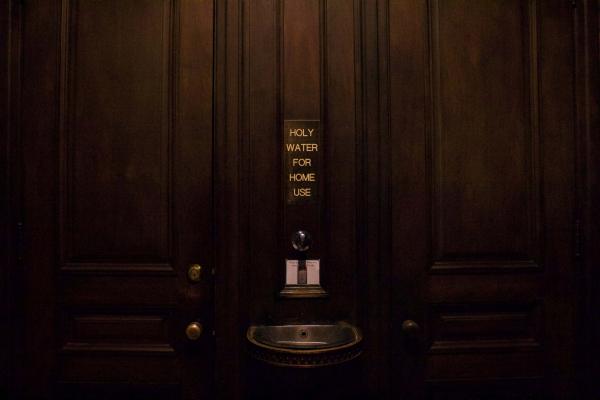In the midst of the COVID-19 pandemic, churches in America can be a valuable resource from a public health perspective. As a public health professional, I know that life-saving decisions can come down to valuing people over money, prioritizing humility over ego, and listening to the vulnerable over the powerful. These three values should be quite centric to the church; they're something that members of the church have practiced through ritual and through conversation throughout their entire lives. A public health crisis is simply the point in time in which these values become visibly practical rather than simply countercultural.
This does mean, though, that other habits of the church — such as meeting together weekly in a large group setting, participating in the Eucharist, and passing a donation basket — might need to shift temporarily in the interest of the most vulnerable among us.
A pandemic of this magnitude is an opportunity to ask ourselves: What is the true function of community? Does a community function to meet together, or does it function to serve one another, to put one another first? If a community is based solely on seeing one another weekly, that’s more of a meet-up group than a community. There’s an opportunity, and an invitation, for growth into a more dynamic, loving group of people who share one another’s burdens financially and emotionally, who are willing to disrupt their own routines and make sacrifices to prioritize the health of someone else, and who will fight for one another in both the short and long term. When we shift into this perspective of community, not only are we mutually nourished by both giving and receiving support, but the tight grip on routine begins to loosen in favor of sacrifice for one another. Our priorities shift. In an pandemic, this priority shift is extremely important.
Although churches can work to change the systems that make health care inaccessible for the most vulnerable populations with or without an health crisis, there are a few ways in which the church is positioned to help their communities during this pandemic.
Churches contain members across the entire spectrum of vulnerability to this virus — people with compromised immune systems, older folks, health care workers, and people frequenting hospitals for clinical trials, to name a few. In responding to COVID-19 specifically, churches should ask themselves who among them is the most vulnerable and then act in the best interest of those people. Some church members are also health care professionals — from medical doctors to public health specialists. Lift up the voices of the health care professionals in your community and heed their warnings.
Churches should be sure that their congregation is equipped with all the necessary and updated information, including the local coronavirus hotline number, the symptoms to look out for, whether the coronavirus test is free in your area, and sources for trustworthy information. Also consider the method used to communicate this information. If you’re choosing email for instance, would everyone — including high-risk elderly groups — have access to the internet or have computer literacy? If not, perhaps a phone call for some of these folks might work best. You know your community best. Choose the method that would serve the most vulnerable among you.
COVID-19 reminds us that we cannot function alone. Some social gaps can make people more vulnerable. For example, if someone in your community has the symptoms of COVID-19, would that person have someone to call? They may need a method to get to the hospital. They may need help in paying for the medical bills because they’re uninsured or underpaid. If schools closed down in your area, and the parents still needed to go to work, would the children have somewhere to go? Would they have something to eat? If someone in your community is experiencing anxiety regarding the virus, are your community members equipped for the pastoral care work of acknowledging fear and offering solidarity and love?
If you are one of the people who is at low risk, as we currently understand the virus, then I would still encourage you on an individual level, as on a communal level, to make decisions in the best interest of the vulnerable.
As this pandemic continues, the ways that our society has already failed the vulnerable will be laid bare. Not everyone can afford to stock up on food and soap in advance. People who rely on hourly wages may have those hours cut because of closures. Some have no insurance or plans with high deductibles and cannot afford to see a doctor no matter how severe the symptoms get. Even those with insurance may not be able to stock up in advance on necessary medication due to insurance limits.
If someone does contract COVID-19, the social stigma is severe and isolating. If a quarantine is enacted, the social isolation may cause some to feel particularly lonely and devastated, especially if they do not have access to a computer or have computer literacy. Some students who attend college campuses that are temporarily shut down have no alternative housing or food options. Some people are facing racist and xenophobic attacks based on where the virus originated. All of these represent ways that community has broken down, but also opportunities for the church to step in and respond with solidarity and love.
On a broader, long-term level, there are also opportunities for churches to fight the systems that created some of these avoidable vulnerabilities in the first place. From universal health care to federal paid sick leave and higher wages; from paying prisoners fairly for labor to ensuring there’s a plan to prevent spread of contagious viruses in prisons and other detention centers; from fighting against price surges on life-saving goods to fighting for free and accessible vaccines.
COVID-19 forces us to push back against the narrative of individualism and remember that we all depend on each other. In the face of this, churches can mobilize to meet both the physical and emotional needs of their congregants and their communities, as well as to practice the perspective of putting the most marginalized, vulnerable folks at the center of decision-making. This pandemic will reveal who we are. Hopefully it will reveal that we are love.
Got something to say about what you're reading? We value your feedback!






